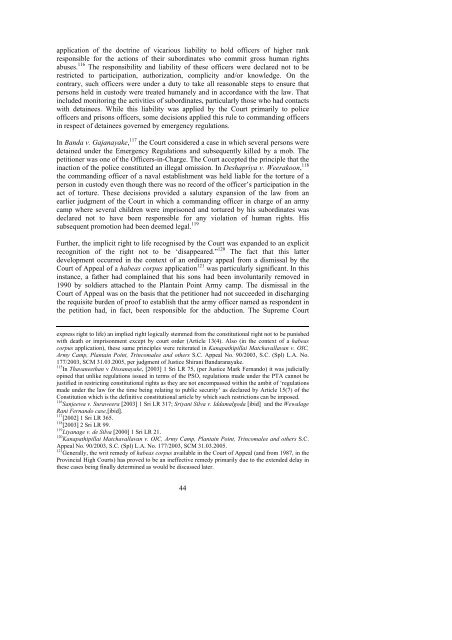Untitled - International Commission of Jurists
Untitled - International Commission of Jurists
Untitled - International Commission of Jurists
Create successful ePaper yourself
Turn your PDF publications into a flip-book with our unique Google optimized e-Paper software.
application <strong>of</strong> the doctrine <strong>of</strong> vicarious liability to hold <strong>of</strong>ficers <strong>of</strong> higher rank<br />
responsible for the actions <strong>of</strong> their subordinates who commit gross human rights<br />
abuses. 116 The responsibility and liability <strong>of</strong> these <strong>of</strong>ficers were declared not to be<br />
restricted to participation, authorization, complicity and/or knowledge. On the<br />
contrary, such <strong>of</strong>ficers were under a duty to take all reasonable steps to ensure that<br />
persons held in custody were treated humanely and in accordance with the law. That<br />
included monitoring the activities <strong>of</strong> subordinates, particularly those who had contacts<br />
with detainees. While this liability was applied by the Court primarily to police<br />
<strong>of</strong>ficers and prisons <strong>of</strong>ficers, some decisions applied this rule to commanding <strong>of</strong>ficers<br />
in respect <strong>of</strong> detainees governed by emergency regulations.<br />
In Banda v. Gajanayake, 117 the Court considered a case in which several persons were<br />
detained under the Emergency Regulations and subsequently killed by a mob. The<br />
petitioner was one <strong>of</strong> the Officers-in-Charge. The Court accepted the principle that the<br />
inaction <strong>of</strong> the police constituted an illegal omission. In Deshapriya v. Weerakoon, 118<br />
the commanding <strong>of</strong>ficer <strong>of</strong> a naval establishment was held liable for the torture <strong>of</strong> a<br />
person in custody even though there was no record <strong>of</strong> the <strong>of</strong>ficer’s participation in the<br />
act <strong>of</strong> torture. These decisions provided a salutary expansion <strong>of</strong> the law from an<br />
earlier judgment <strong>of</strong> the Court in which a commanding <strong>of</strong>ficer in charge <strong>of</strong> an army<br />
camp where several children were imprisoned and tortured by his subordinates was<br />
declared not to have been responsible for any violation <strong>of</strong> human rights. His<br />
subsequent promotion had been deemed legal. 119<br />
Further, the implicit right to life recognised by the Court was expanded to an explicit<br />
recognition <strong>of</strong> the right not to be ‘disappeared.” 120 The fact that this latter<br />
development occurred in the context <strong>of</strong> an ordinary appeal from a dismissal by the<br />
Court <strong>of</strong> Appeal <strong>of</strong> a habeas corpus application 121 was particularly significant. In this<br />
instance, a father had complained that his sons had been involuntarily removed in<br />
1990 by soldiers attached to the Plantain Point Army camp. The dismissal in the<br />
Court <strong>of</strong> Appeal was on the basis that the petitioner had not succeeded in discharging<br />
the requisite burden <strong>of</strong> pro<strong>of</strong> to establish that the army <strong>of</strong>ficer named as respondent in<br />
the petition had, in fact, been responsible for the abduction. The Supreme Court<br />
express right to life) an implied right logically stemmed from the constitutional right not to be punished<br />
with death or imprisonment except by court order (Article 13(4). Also (in the context <strong>of</strong> a habeas<br />
corpus application), these same principles were reiterated in Kanapathipillai Matchavallavan v. OIC,<br />
Army Camp, Plantain Point, Trincomalee and others S.C. Appeal No. 90/2003, S.C. (Spl) L.A. No.<br />
177/2003, SCM 31.03.2005, per judgment <strong>of</strong> Justice Shirani Bandaranayake.<br />
115 In Thavaneethan v Dissanayake, [2003] 1 Sri LR 75, (per Justice Mark Fernando) it was judicially<br />
opined that unlike regulations issued in terms <strong>of</strong> the PSO, regulations made under the PTA cannot be<br />
justified in restricting constitutional rights as they are not encompassed within the ambit <strong>of</strong> ‘regulations<br />
made under the law for the time being relating to public security’ as declared by Article 15(7) <strong>of</strong> the<br />
Constitution which is the definitive constitutional article by which such restrictions can be imposed.<br />
116 Sanjeewa v. Suraweera [2003] 1 Sri LR 317; Sriyani Silva v. Iddamalgoda [ibid] and the Wewalage<br />
Rani Fernando case,[ibid].<br />
117 [2002] 1 Sri LR 365.<br />
118 [2003] 2 Sri LR 99.<br />
119 Liyanage v. de Silva [2000] 1 Sri LR 21.<br />
120 Kanapathipillai Matchavallavan v. OIC, Army Camp, Plantain Point, Trincomalee and others S.C.<br />
Appeal No. 90/2003, S.C. (Spl) L.A. No. 177/2003, SCM 31.03.2005.<br />
121 Generally, the writ remedy <strong>of</strong> habeas corpus available in the Court <strong>of</strong> Appeal (and from 1987, in the<br />
Provincial High Courts) has proved to be an ineffective remedy primarily due to the extended delay in<br />
these cases being finally determined as would be discussed later.<br />
44
















